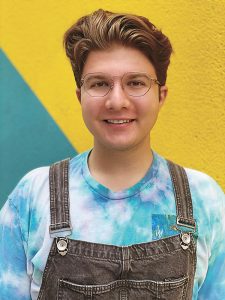
FFRF awarded Luke $2,000.
By Luke Ortiz-Grabe
In contemporary American society, religion has become a tool for legitimizing efforts to hinder or reverse significant social progress aimed at creating a more equitable society. Some of the most recent challenges against equity-oriented progress, namely the reversal of Roe v. Wade and the proliferation of anti-DEI legislation, all maintain a uniquely religious component to their arguments.
In seeing all the hate, bigotry and discrimination that lie behind religion, I recognize the power that secular action possesses to fight for a more equitable America while also solidifying my identity as an agnostic person. Therefore, I am a part of the nonreligious cultural transformation in America because empowering secular change has the strongest possibility to fight against the use of religion to prevent progress and preserve discriminatory systems.
Exploring my agnosticism with other aspects of my identity has led me to additional factors that affirm my beliefs. As a Mexican American, I am aware of the imposition of Christianity on my community through colonization, and that the legacy of violence in the name of religious conversion continues to have devastating consequences. As a queer person, I found that agnosticism has helped me reckon with the use of religion to condone discrimination against fellow LGBTQ-plus people. In intertwining my agnosticism with my other identities, I find myself further committed to my beliefs and better able to tackle current issues stemming from colonization and discrimination as I can use secular forms of community engagement to begin to repair harm to my community.
In my conversations with fellow religiously unaffiliated Gen-Zers, the reason for their lack of belief also stems from a similar disdain and disillusionment with the role that religion plays in American politics and society. Especially among those forced to attend religious services as a child, many have witnessed the continual linkage between tenets of faith and the preservation of systems of oppression and division within the United States. Additionally, many Gen-Zers now realize that the utilization of religion to legitimize hate has been central to many historical and contemporary atrocities that we continue to reckon with. In searching for ways to fight against inequality in America, many are aware that they no longer want to participate in a system that divided and condoned discrimination against people for centuries.
In considering the power secularism has to spur positive social change and the harm that religion has caused as a tool for hate, the benefits of this religiously unaffiliated movement for an individual are plentiful. In rejecting religious affiliation, humankind can cast aside many biases society uses religion to justify. Moving beyond any religion-imposed morality creates the opportunity to see the harm that those biases have created and to develop a motivation to make the world a better place, especially for those suffering under systems of oppression.
Moreover, the religiously unaffiliated movement also offers great benefit for American society as a whole. By shifting the focus away from religious forms of community engagement, the lessons from nonreligious disciplines such as sociology become integral to creating positive secular change. With more people choosing to adopt nonreligious beliefs, the systems of oppression and the divisive nature of social transformation within America gradually lose the support of an institution that has always been a locus of hate and violence.
It is only through Gen Zers and future generations continuing to reject religious affiliation that the United States will have the power to begin to heal from the harm and oppression that religious affiliation has created and to bring about a new America, one that focuses on uplifting all people.
Luke, 21, is from Highlands Ranch, Colo., and attends Colorado College, majoring in international political economy.
“I am extremely committed to LGBTQ-plus activism, where I work with local organizations to increase access to affirming health care services in my college community,” Luke writes. “I hope to eventually go to law school and go on to work on protecting marginalized communities from systems of oppression in the hopes of creating a better America for all people.”

